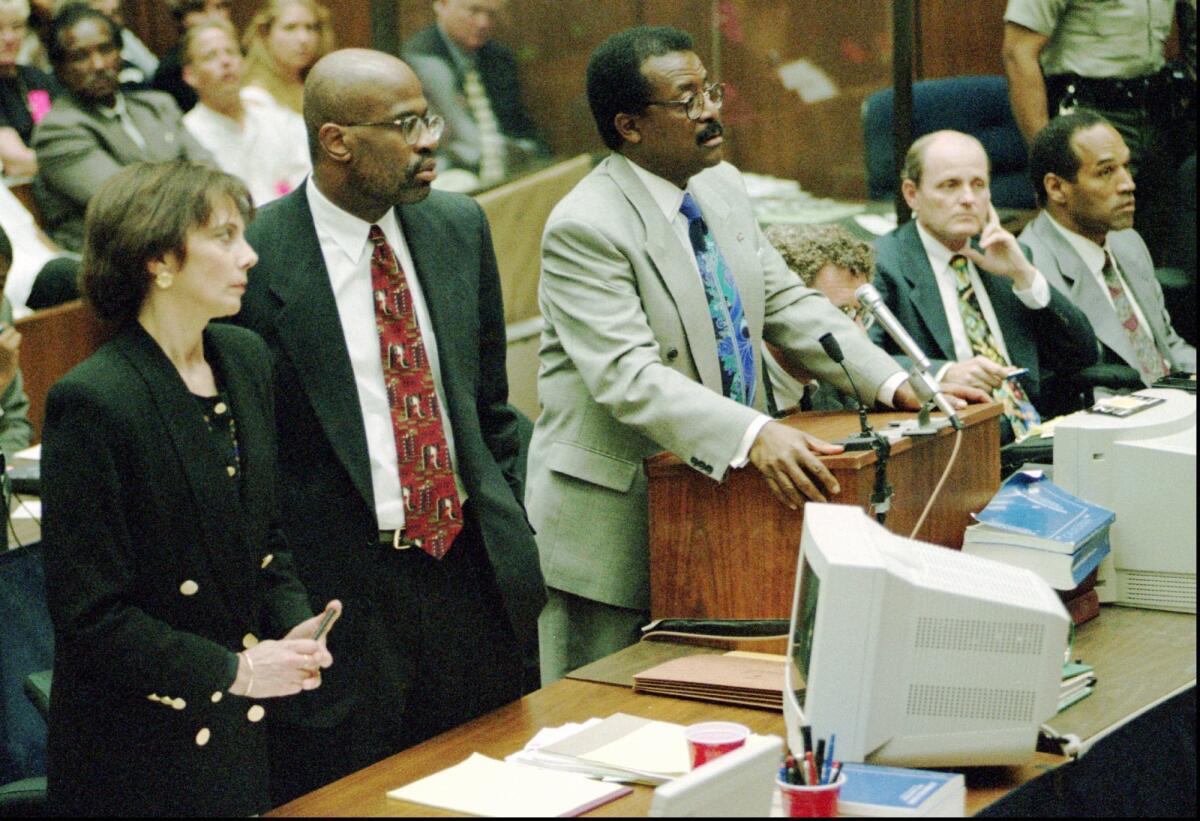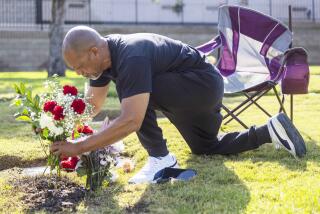Op-Ed: Growing up Darden and dealing with the racial backlash from the O.J. trial

From left, prosecutors Marcia Clark and Christopher Darden, defense attorneys Johnnie Cochran Jr. and Robert Blasier and defendant O.J. Simpson at the latter’s trial on Aug. 15, 1995 in Los Angeles.
- Share via
“Are you going to watch this O.J. show?” I asked my father over drinks.
“Nope.”
“Why?” I asked, though I should have known what he would answer.
“I lived it.”
I was 15 years old in 1994 when my father, Christopher Darden, joined the prosecution team against O.J. Simpson, a case very much in the news again thanks to “The People vs. O.J. Simpson,” now airing on FX. To say the least, it was a turbulent time for me: the daughter of a black prosecutor, prosecuting a successful black man in the trial of the 20th century.
I grew up in East Oakland, in a mostly black and Latino neighborhood. My parents never married and I lived with my mother. Life before the trial was simple. Our street had less crime compared to other blocks in the area, and all I wanted in life were straight A’s, a boyfriend who shared my love for X-Men cartoons, and TLC concert tickets. As the racial tensions surrounding the case grew, so did my anxiety. I worried the students at my predominantly black high school would harass me when they found out about my father. Many black people sided with Simpson and thought my father was a traitor.
Most of my classmates told me, “I don’t agree with what your daddy is doing, but you’re cool so I support you.” But not everyone felt compassion. While walking down the stairs after class one day, a black kid stopped me on the steps when other students were around. He said to my face, “Dude, I’m sorry, but your father is a Tom. A straight up sellout.” Then he strutted away as if he’d accomplished something. Embarrassment and shock left me speechless.
On the flip side, black people who suspected I was related to “that Darden” and believed Simpson was guilty would whisper conspiratorially in my ear. “I think he did it,” they’d say, “but don’t tell anyone I told you that.” They feared others would consider them sellouts too.
I understood why many black people, especially black people in Los Angeles, supported Simpson. I remember the beating of Rodney King and the shooting death of Latasha Harlins, 15, over a bottle of orange juice. Like today, black folks were tired of racially motivated killings. Still it hurt to see my father, a proud black man who encouraged me to embrace my heritage, be called a traitor. My father wanted justice for victims Nicole Brown and Ron Goldman.
I admired my father’s courage in the chaos. He received death threats but never let on that he was concerned.
“Are you OK?” I asked my father over the phone.
“Don’t worry about me. I just want to make sure you’re safe,” he calmly replied so I wouldn’t panic. It didn’t work.
I admired my father’s courage in the chaos. He received death threats but never let on that he was concerned.
My parents told my school about the threats and asked security officers to keep their eyes open. We postponed visits to Los Angeles. The O.J. trial became more than a trial, it became a national spectacle, and I desperately hoped it would end quickly. It lasted more than eight months.
When my family wasn’t praying through death threats, we were dealing with the media. Strange-looking men rang my mother’s doorbell for the scoop on my dad. Paparazzi called my private line, an unlisted number. I have no idea how they found it.
“Hi, is this Jenee?” a woman asked in the condescending tone adults use with toddlers.
“Who is this?”
“We’re from a magazine. You want to tell us some stuff about your daddy?”
I hung up.
My mother loved reading gossip pages in the grocery store. I found them silly. But guess who landed in a tabloid? “FOUND! Doting Dad Darden’s Secret Love Child” covered the front page of one rag. Apparently, they found my conception out of wedlock newsworthy. I was never a secret. I opened the magazine to see a page-length photo of me in my winter ball gown. A black bar covered my eyes because I was a minor. Next to me was a picture of my uncle’s ex-wife, who’d sold the photo to the tabloid.
A few days later I headed to my locker before the homeroom bell. I passed a cluster of students huddled around copies of the tabloid, reading the “article” about me. They tried to hide it before I saw them. They thought it was cool. I found it bizarre and uncomfortable.
But my experience is nothing compared to what my father’s other relatives endured. Paparazzi hounded my uncle while he suffered with AIDS. They even had the audacity to call my grandparents and ask how they felt about my uncle’s illness while he was on his deathbed. He passed away the month after the trial ended.
The public’s emotions remained raw long after the trial. Since I didn’t know if people I came across hated my father, I rarely told anyone I was his daughter.
“Hey, I noticed your last name is Darden,” said the short, middle-aged black man from my Bay Area fitness class in 2003. I knew what was coming next.
“Are you related to Chris Darden, the bald-headed guy from the O.J. trial?”
I gave my usual response.
“Oh, no,” I lied.
“Good,” he said while pounding his clenched fist into his palm. “Man, if I ever saw that [racial slur] I’d ... “
Unlike my father, I’m watching the FX miniseries. I’m too curious to refrain. On the whole I find it captivating, but my concern is the same as ever — that the drama surrounding the case overshadows the brutal deaths of two people. Whether you think Simpson is guilty or innocent, Ron Goldman’s family lost a son and brother. Nicole Brown’s children are without a mother. There’s nothing glamorous about that at all.
Jenee Darden is a journalist who covers women, race and “The People vs. O.J. Simpson” on her blog CocoaFly.com.
Follow the Opinion section on Twitter @latimesopinion and Facebook
More to Read
A cure for the common opinion
Get thought-provoking perspectives with our weekly newsletter.
You may occasionally receive promotional content from the Los Angeles Times.










